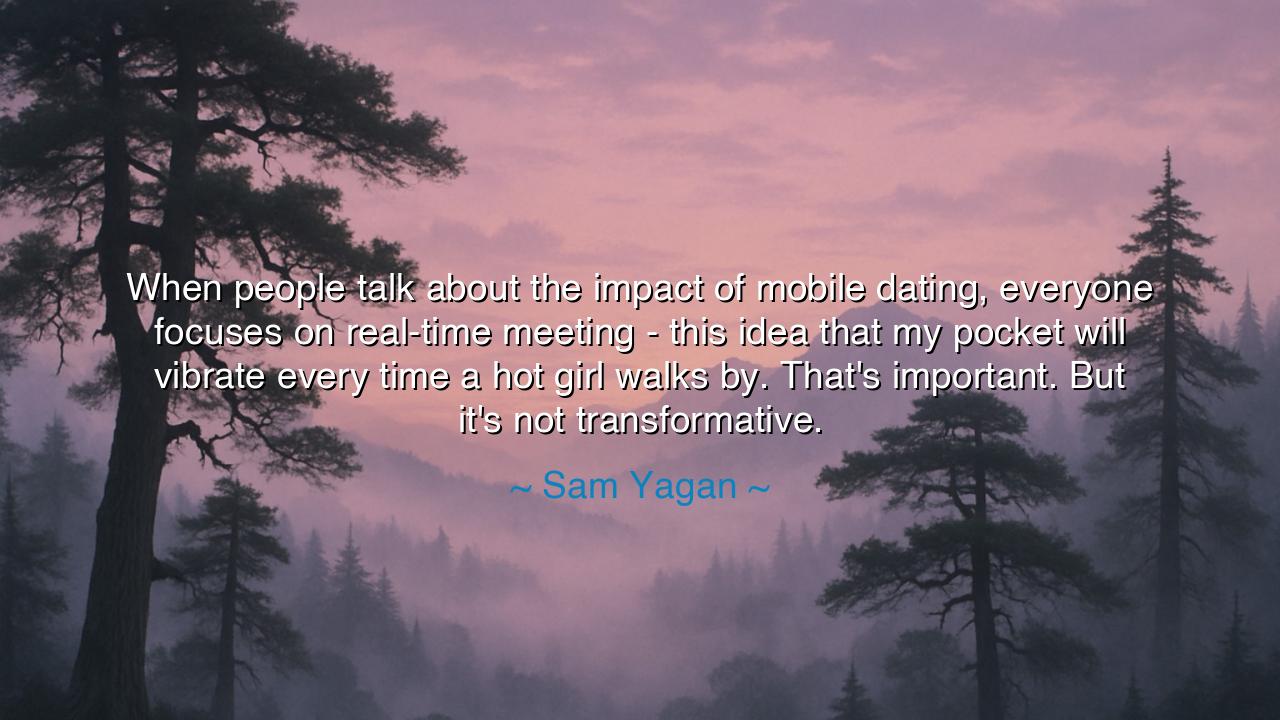
When people talk about the impact of mobile dating, everyone
When people talk about the impact of mobile dating, everyone focuses on real-time meeting - this idea that my pocket will vibrate every time a hot girl walks by. That's important. But it's not transformative.






In the words of Sam Yagan, one of the visionaries who helped shape the modern world of digital connection, there is both irony and insight: “When people talk about the impact of mobile dating, everyone focuses on real-time meeting — this idea that my pocket will vibrate every time a hot girl walks by. That’s important. But it’s not transformative.” Though his words spring from the age of algorithms and smartphones, their meaning is timeless. Yagan speaks not merely of technology, but of the difference between convenience and transformation, between what excites the senses and what elevates the soul. His observation, wrapped in humor, unveils a profound truth about human progress — that the greatest revolutions are not those that make life faster, but those that make it deeper.
At first, his imagery may stir laughter — the notion of a man’s device trembling as potential love passes by. But beneath the jest lies a reflection on modern restlessness. Humanity, ever hungry for immediacy, has come to equate vibration with connection, signal with meaning. Yagan challenges this illusion. He reminds us that while technology can facilitate encounter, it cannot replace the essence of relationship — the growth, patience, and vulnerability that true connection requires. To him, the “vibration in the pocket” symbolizes the fleeting spark of attraction, but the transformative power of love lies in the quiet cultivation that follows, beyond the screen, beyond the instant.
To understand this wisdom, we must look to the origin of Yagan’s insight — his role as one of the architects of modern dating platforms like OkCupid and Match Group. He stood at the crossroads where human longing met machine logic. He witnessed how billions of people began to seek love not in crowded rooms but in silent swipes, how the ancient ritual of courtship was reborn in the glow of digital light. Yet even as he helped build these tools, he saw that the true transformation was not in the speed of meeting, but in the way technology expanded the horizons of possibility. A peasant in one land could speak to a poet in another. A shy heart could find courage behind the veil of a message. The miracle was not that we could meet instantly, but that the boundaries of the world had dissolved.
The ancients too wrestled with the same tension between immediacy and meaning. Consider Pygmalion, the sculptor who carved a statue so perfect he fell in love with it. The gods, moved by his passion, granted life to the marble — but the true miracle was not the transformation of stone into flesh; it was the awakening of Pygmalion’s heart. So too, in Yagan’s world, technology gives life to interaction, but the awakening of empathy and love remains the true miracle. A vibrating phone may announce proximity, but it cannot teach tenderness. For that, the heart must still be sculpted by time, understanding, and faith in something beyond immediacy.
Yagan’s words carry a warning, too — that progress without purpose becomes distraction. Humanity’s power to create tools is vast, but without reflection, tools become idols. The promise of mobile dating was to connect souls across time and distance; yet too often, it has become a marketplace of passing glances, a theater of endless novelty. “That’s important,” Yagan concedes, acknowledging the role of attraction, “but it’s not transformative.” He calls us to remember that technology should serve love, not replace it — that the truest innovation lies in using machines to amplify the human spirit, not diminish it.
The lesson, then, is one of discernment. In every age, new inventions promise to make life easier, faster, more exciting. But wisdom asks: do they also make us better? Do they deepen our understanding, our compassion, our capacity to love? The ancients taught that the noblest progress is inward — the shaping of character, the widening of the heart. Yagan’s reflection, though born from modern machinery, echoes that same truth. Let us not mistake motion for meaning, nor stimulation for transformation. Let our tools, however advanced, remain servants of the spirit.
And so, my friends, remember this: the world will continue to vibrate with signals and screens, offering the illusion of closeness at the touch of a button. But transformation — the kind that changes who we are — begins only when we look beyond the glow of our devices and into the light of another soul. Technology may open the door, but it is the human heart that must walk through. As Yagan reminds us, the true revolution will not come from the device in your pocket, but from the depth of connection you carry in your being.






AAdministratorAdministrator
Welcome, honored guests. Please leave a comment, we will respond soon